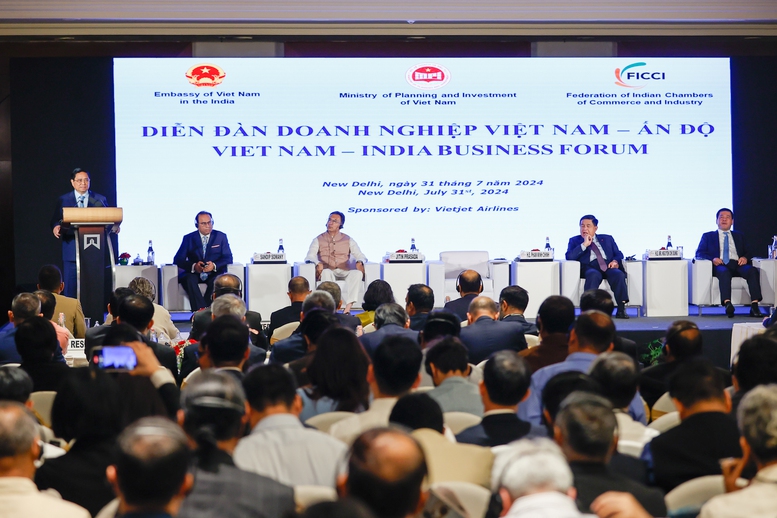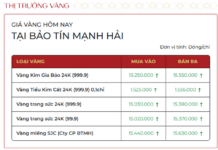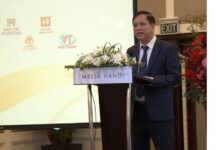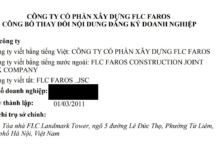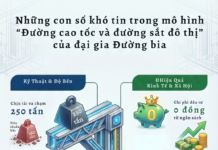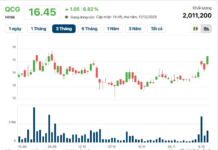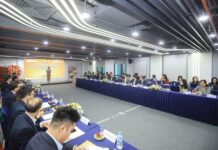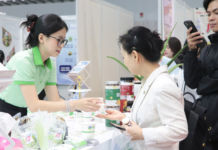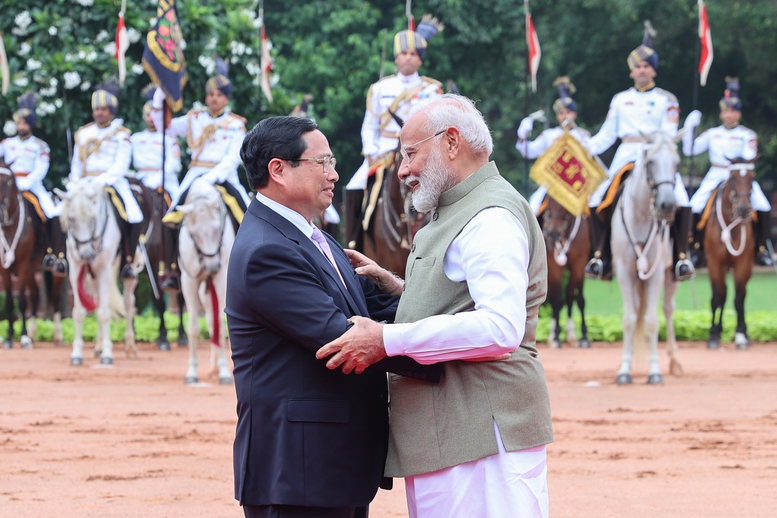
Indian Prime Minister Narendra Modi warmly welcomes Prime Minister Pham Minh Chinh on his state visit to India – Photo: VGP/Nhat Bac
In the early morning of August 2, Prime Minister Pham Minh Chinh and the high-ranking Vietnamese delegation arrived in Hanoi, successfully concluding the state visit to India from July 30 to August 1 at the invitation of Indian Prime Minister Narendra Modi.
This is the first visit to India by a Vietnamese Prime Minister since the two countries established their Comprehensive Strategic Partnership in 2016. Prime Minister Pham Minh Chinh is also one of the first foreign leaders that Prime Minister Narendra Modi invited for a state visit to India after his re-election for a third consecutive term.
The visit took place amid the two countries’ preparations for the important milestones of the 10th anniversary of the establishment of the Comprehensive Strategic Partnership in 2026 and the 55th anniversary of diplomatic relations in 2027.
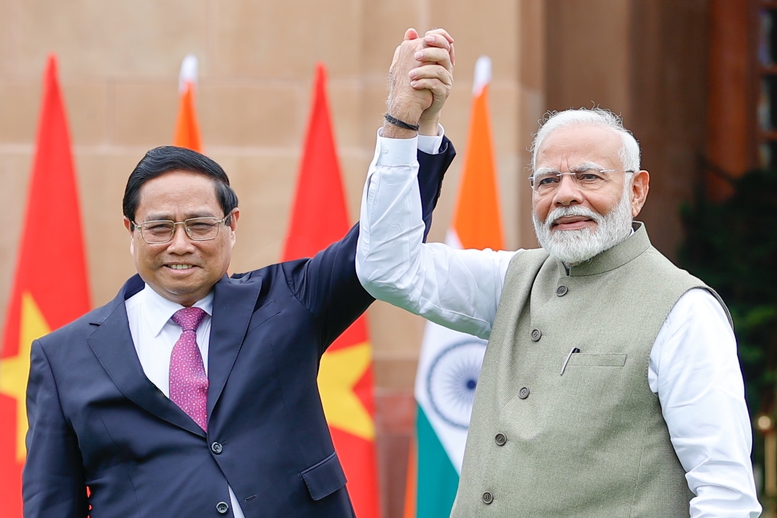
After the welcoming ceremony, the Prime Minister held a restricted meeting with Indian Prime Minister Narendra Modi – Photo: VGP/Nhat Bac
Within just two days, the Prime Minister had a full schedule with intensive and high-level activities, including about 25 events such as summits, meetings with Indian leaders and major corporations, and speeches at the Vietnam-India Business Forum and the Council on Foreign Relations of India.
The visit was a great success, achieving its set goals with specific and practical outcomes, meeting the interests and expectations of both sides. The visit holds great significance, creating a new momentum and opening a new chapter of substance and breadth, with more opportunities for Vietnam-India relations.
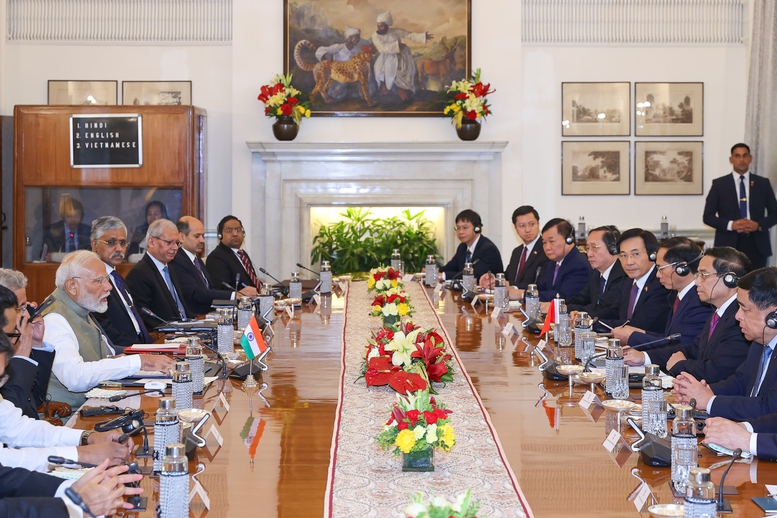
At the summit, the two Prime Ministers agreed to implement strong measures to achieve the goal of doubling two-way trade and investment by 2030 – Photo: VGP/Nhat Bac
Toward a Bright Future Based on Millennial Relations
The meetings and exchanges between the Prime Minister and Indian leaders helped affirm the close friendship and traditional bond between the two countries, as well as the importance and support that the two countries attach to each other in their respective foreign policies.
During the meetings, the two sides shared a strategic vision of the world today, acknowledging the significant progress and great achievements, and remarkable strides made in bilateral relations, especially since the establishment of the Comprehensive Strategic Partnership in 2016.
They agreed that Vietnam and India have high political trust, similar cultures and civilizations, compatible ideas, complementary economies, and a shared aspiration to build strong and prosperous nations. There is still much potential and room for cooperation, and it is necessary to vigorously promote these aspects to keep up with the general trend of the times and serve the legitimate rights and interests of the people and the development goals of each country.
“We reaffirmed the priority and importance that Vietnam and India attach to each other in their foreign policies; agreed to continue cherishing, preserving, consolidating, and strengthening the traditional relationship between Vietnam and India as sincere, trusted, and loyal friends, standing side by side throughout history, in the present, and in the future; strive to find breakthroughs to elevate bilateral relations to a new height, and enhance the Comprehensive Strategic Partnership between the two countries in the new phase, for the prosperity and strength of each country, and for the material and spiritual happiness of the people of both countries,” Prime Minister Pham Minh Chinh shared with the press after the summit with Prime Minister Modi.
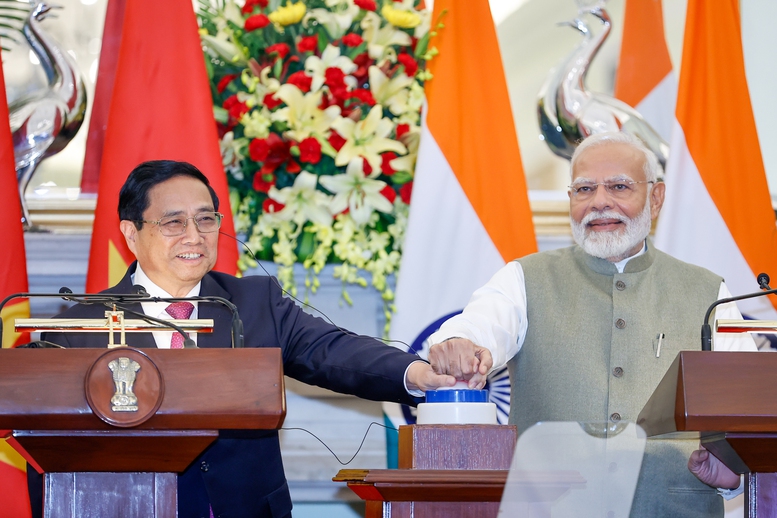
The two Prime Ministers adopted a new plan of action to promote new strides in bilateral relations across all fields – Photo: VGP/Nhat Bac
Also during the meetings, Prime Minister Pham Minh Chinh and his Indian friends frequently recalled the close cultural and religious exchanges between Vietnam and India over thousands of years, which have left deep imprints on the spiritual life of the people. As a result, Buddhism has become an integral part of Vietnamese culture, and world heritage sites such as the My Son Sanctuary in Quang Nam remain to this day.
Not only originating from similar deep-rooted cultural values, Vietnam and India also share a bond of empathy, support, and common ideas in their struggle for Independence, Freedom, and Happiness for their nations. President Ho Chi Minh and Indian leaders such as Mahatma Gandhi and Jawarhalal Nehru, along with the generations of leaders and people of the two countries, have diligently cultivated the traditional friendship and solidarity between Vietnam and India.
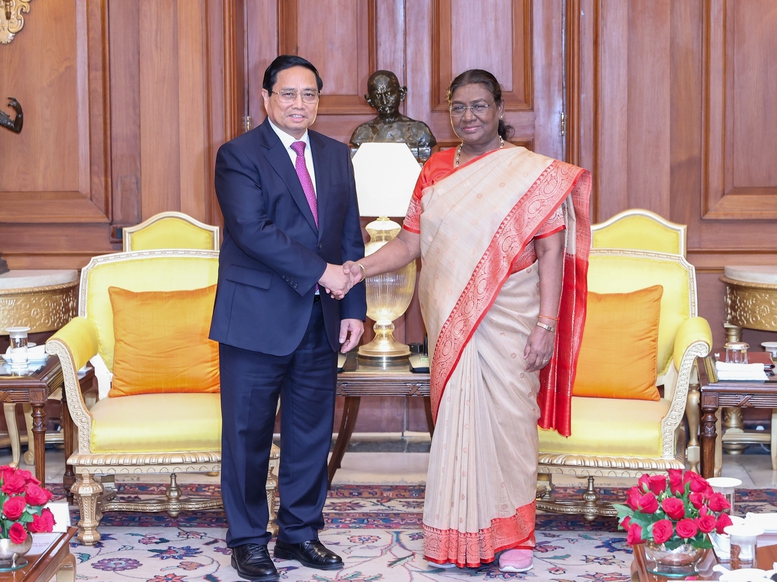
Meeting with President Droupadi Murmu, Prime Minister Pham Minh Chinh emphasized that Vietnam always remembers India’s valuable support in the past struggle for national liberation, as well as in the current national construction and development – Photo: VGP/Nhat Bac
In 1946, President Ho Chi Minh sent a congratulatory telegram to the first free Indian government. In 1954, Indian Prime Minister Jawaharlal Nehru was the first world leader to visit Vietnam, right after the liberation of Hanoi.
Throughout history, the friendship and cooperation between Vietnam and India have continuously developed comprehensively and substantively. India was one of Vietnam’s first three Strategic Partners (2007). The establishment of the Comprehensive Strategic Partnership framework in 2016 marked a historic milestone, providing a strong impetus for expanding and deepening the relationship between the two countries in various fields.
Prime Minister Pham Minh Chinh stated that in the current context of rapid and complex international developments, the two countries need to strongly promote the traditional friendship and solidarity, and cooperate closely and effectively to achieve new strategic goals.
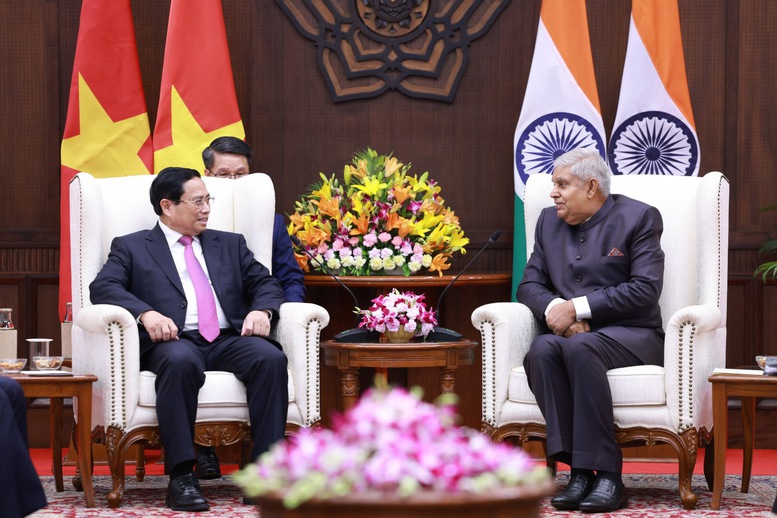
Vice President and Chairman of the Rajya Sabha Jagdeep Dhankhar emphasized that Vietnam is a traditional friend and an important Comprehensive Strategic Partner of India – Photo: VGP/Nhat Bac
Prime Minister Narendra Modi affirmed that Vietnam is a strong pillar in India’s Act East policy and a key partner in India’s vision for the Indo-Pacific region. He stated that the development vision towards 2047, when India will celebrate 100 years of independence, and Vietnam’s development vision towards 2045, when it will celebrate 100 years of its National Day, will open new channels of cooperation beneficial to both countries.
“Placing Vietnam in an important position as the ‘focus’ and ‘bridge’ in the ‘Act East’ policy has contributed to promoting Vietnam-India relations in general and economic relations in particular to new heights,” Prime Minister Pham Minh Chinh assessed. The Prime Minister clarified that Vietnam strongly supports India’s Act East policy and its increasingly important role in important regional and global cooperation mechanisms.
Especially during this visit, the strong solidarity and profound friendship between the two countries were further affirmed through the condolences that Indian leaders and people sent to the Party, State, Government, and people of Vietnam upon the passing of General Secretary Nguyen Phu Trong.
As a great and close friend of the Indian people, General Secretary Nguyen Phu Trong visited India in 2012, witnessed the elevation of bilateral relations to a Comprehensive Strategic Partnership in 2016, and hosted and worked with many Indian leaders, including Prime Minister Narendra Modi.
The Indian Parliament held a moment of silence, and the Indian Government sent the National Security Advisor to Vietnam to pay respects to General Secretary Nguyen Phu Trong. During the visit, Prime Minister Modi, on behalf of 1.4 billion Indian people and himself, expressed deep condolences for the great loss of the country and people of Vietnam.
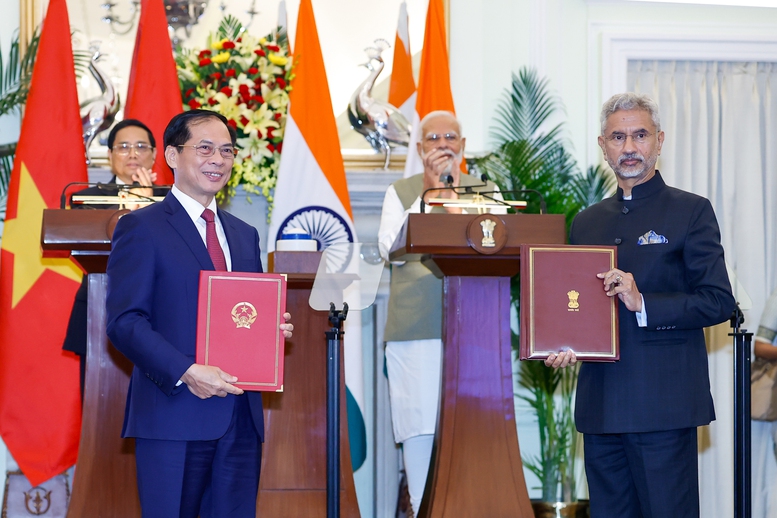
After the summit, Prime Minister Pham Minh Chinh and Indian Prime Minister Narendra Modi witnessed the signing of the Vietnam-India Joint Statement on the Comprehensive Strategic Partnership by the two Foreign Ministers – Photo: VGP/Nhat Bac
Enhancing the Comprehensive Strategic Partnership Based on “Five Mores”
Based on the solid foundation of 52 years of bilateral relations, in the context of new strengths and positions of the two countries, as well as rapid changes in the regional and global situation, the leaders of the two countries affirmed their determination to strengthen and deepen the Comprehensive Strategic Partnership between Vietnam and India in the coming years, meeting the aspirations and interests of the two peoples.
Accordingly, the two sides will strengthen cooperation in traditional fields such as defense and security, trade and investment, culture and education, and expand cooperation in new areas such as green economy, digital economy, circular economy, sharing economy, and knowledge economy. The visit also affirmed that Vietnam and India always support each other and are ready to cooperate and join hands to build peace, stability, cooperation, and development in the Asia-Pacific and Indian Ocean regions.
The two sides issued a Joint Statement on Enhancing the Comprehensive Strategic Partnership and signed nine documents in the fields of diplomacy, defense, finance, health, culture, tourism, and human resource training, including the Plan of Action to Implement the Comprehensive Strategic Partnership for 2024-2028.
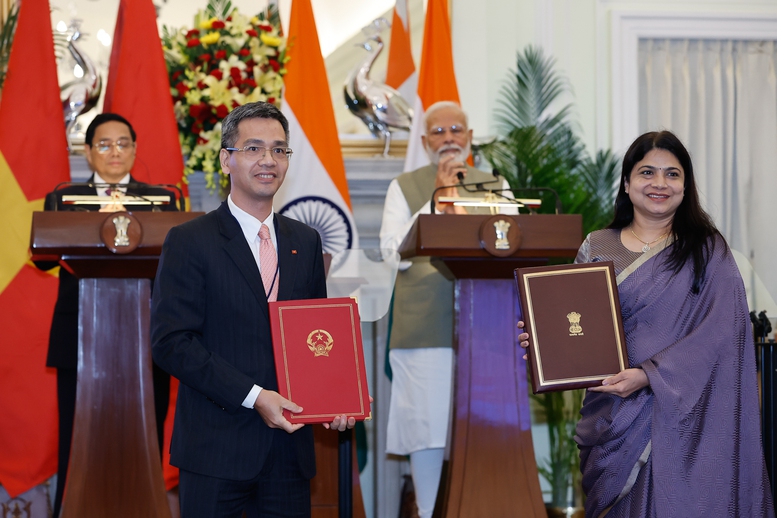
The two Prime Ministers witnessed the signing of two credit agreements worth $300 million between the Vietnamese Ministry of Finance and the Export-Import Bank of India – Photo: VGP/Nhat Bac
Notably, Prime Minister Pham Minh Chinh and Prime Minister Narendra Modi, along with Indian leaders, agreed to strengthen cooperation in the spirit of “Five Mores,” specifically:
First, higher political-strategic trust
. The leaders of the two countries affirmed the importance of further enhancing exchanges and contacts at all levels, including Party, State, Government, and local channels, and continuing to implement the Guest of Honor Program between the two sides. At the same time, they agreed to enhance the effectiveness of existing cooperation mechanisms.
Vietnam’s announcement of its participation in the Coalition for Disaster Resilient Infrastructure (CDRI) and its intention to complete the procedure to join the International Solar Alliance (ISA), two important global initiatives of India, has contributed to consolidating mutual trust between the two countries.
Second, deeper defense and security cooperation
, with the effective implementation of the Joint Vision Statement on Vietnam-India Defense Partnership towards 2030, and the expansion of cooperation in maritime security, cybersecurity, and counter-terrorism. The signing of a $500 million credit package for defense is a breakthrough during the visit.
Third, more substantive and effective economic, trade, and investment cooperation, with breakthroughs
. The two sides aim for a two-way trade turnover of $20 billion and a doubling of two-way investment by 2030. Vietnam has proposed that India address trade barriers, sign the Agreement on Electronic Commerce and the Bilateral Trade Agreement to maximize the retail market potential in line with new trends, and promote Vietnamese products with strengths in the large and potential Indian market, such as electronics, textiles, and agricultural products. Vietnam also aims to attract large Indian corporations to invest in infrastructure, pharmaceuticals, and energy. On this occasion, businesses from the two countries signed six major contracts in aviation, airports, and logistics.
Fourth, more open cooperation in science and technology and innovation
. Accordingly, the two sides agreed to promote cooperation in research and development (R&D) and innovation in core technologies, semiconductors, artificial intelligence, nuclear energy, rare earths, and expand cooperation in petrochemicals and new energy fields, as well as promote the establishment of joint ventures in information technology products and human resource training in this industry.
Fifth, closer cultural, tourism, and people-to-people exchanges
. The two sides agreed to soon sign a cooperation agreement on tourism, strive to double the number of tourists compared to the current level to about 400,000 arrivals per year, and continue to cooperate in the restoration and preservation of the Cham Towers in My Son, Quang Nam, as well as diversify forms of people-to-people exchanges.
To concretize the orientation of “Five Mores,” Prime Minister Pham Minh Chinh proposed five priority directions, namely to consolidate and strengthen strategic trust; renew traditional growth drivers, promote new ones, and develop economic, trade, and investment cooperation commensurate with the stature of the relationship; enhance multilateral cooperation, uphold international law, and realize the vision of peace, stability, cooperation, and development in the oceans and seas; proactively contribute to addressing global challenges; and jointly promote cultural, educational, local connectivity, people-to-people exchanges, and tourism to become endogenous resources and driving forces for the sustainable development of the two countries.
